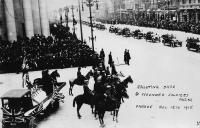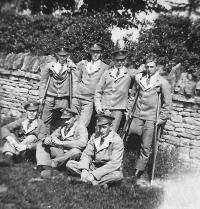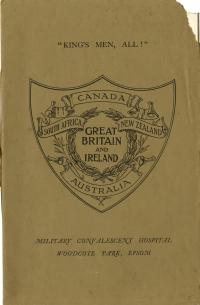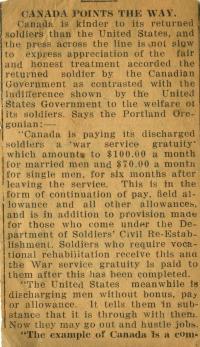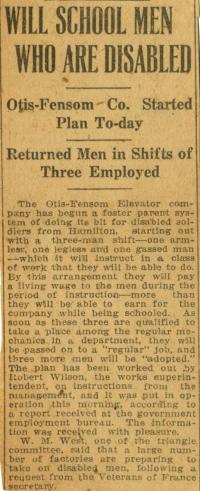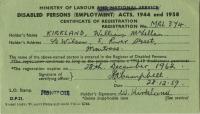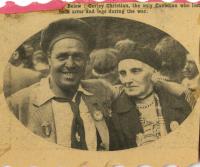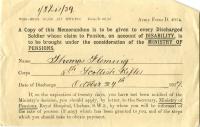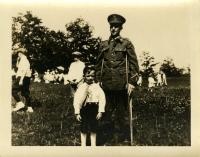Returning
Discharge Depot
Wounded Canadian soldiers were honourably discharged if unable to return to duty. This photograph, taken on 2 September 1916 at the discharge depot in Quebec, featured many soldiers with canes.
Wounded soldiers on parade
Early in the war, the public responded enthusiastically to the return of wounded soldiers. This parade was held on 12 November 1915. Later, there would be less fanfare given to the return of casualties.
The convalescent's uniform
Wounded soldiers in convalescent hospitals were issued with special uniforms - distinguished by the white lapels - to set them apart from the population at large. Once they were ready to be discharged, they returned to wearing standard uniforms.
Woodcote Park, Epsom
The military convalescent camp in Woodcote Park, Epsom, was one of the largest of its kind in the United Kingdom. This brochure features numerous images of the camp's amenities and patients.
Canada Points the way
This newspaper clipping discussed the contrast in treatment of returned soldiers by the Canadian and American governments.
Education for the Disabled
The Otis-Fensome Elevator Company of Hamilton, Ontario offered workplace education to disabled veterans in order to support their return to the workplace.
Registration of Disabled Persons
This certificate of registration for the Disabled Persons (Employment) Acts, 1944 and 1958 was given to disabled veteran William Kirkland in 1959.
Curley Christian
Ethelbert ‘Curley’ Christian was a black Canadian, and the only quadruple amputee of the First World War. He was buried under rubble from German artillery fire for two days during the battle of Vimy Ridge. After being found alive, the stretch-bearers carrying him to safety were killed by enemy fire, despite this, he was brought to safety.
Army Form D
This memorandum belonged to disabled veteran Thomas Fleming of the 8th Scottish Rifles, and was used to claim disability on his pension.
Wounded Soldier and Boy
This wounded Canadian soldier posed with a young boy during a celebration at the Alhambra Presbyterian Church in Toronto, Ontario.


